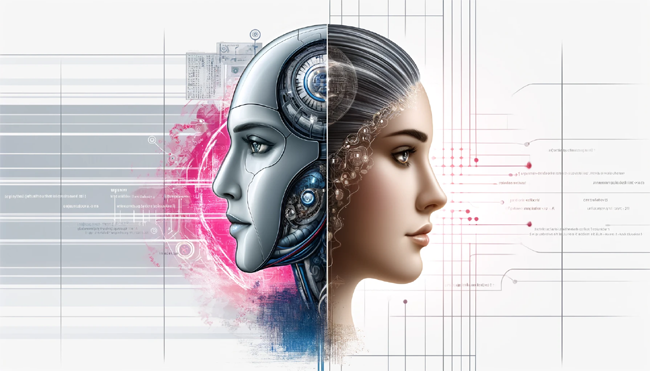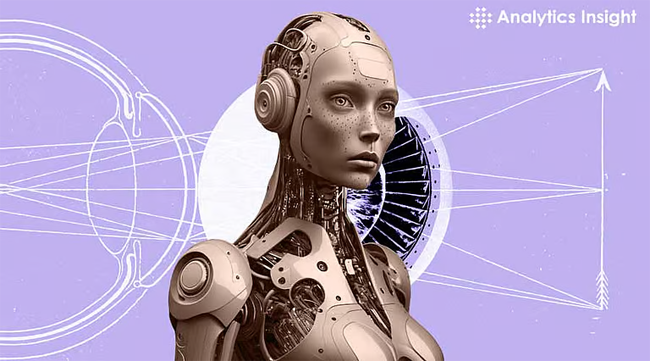
बुद्धिमान कौन एआई या इंसान
बहस का मुद्दा आर्टिफिशियल इंटेलिजेंस है. क्या AI इंसानों से ज़्यादा स्मार्ट होगा. मशीन लर्निंग और कम्प्यूटेशनल पावर में विकास के बारे में अटकलें लगाई जा रही हैं, लेकिन इसमें अंतर्निहित सीमाएँ हैं. इस शोध में, रचनात्मकता, भावनात्मक बुद्धिमत्ता, लोकाचार-आधारित तर्क और लचीलेपन के आधार पर उन कारणों पर चर्चा की गई है कि AI जितना भी उन्नत है, वह मानव मस्तिष्क से ज़्यादा स्मार्ट क्यों नहीं होगा. उप-शीर्षकों के तहत, यह विश्लेषण कृत्रिम प्रणालियों की अंतर्निहित सीमाओं को बताता करता है.
रचनात्मकता और अभिनव सोच
मानव कल्पना उन नवाचारों के लिए ज़िम्मेदार है जिनकी बराबरी कोई कंप्यूटर नहीं कर सकता। इतिहास उदाहरणों से भरा पड़ा है: पिकासो के क्यूबिस्ट ब्रशस्ट्रोक, आइंस्टीन की सापेक्षता और शेक्सपियर के सॉनेट्स। ऐसे नवाचार कल्पना की उपज हैं, एक ऐसा क्षेत्र जिसमें AI पीछे है।
एल्गोरिदम विशाल डेटासेट में पैटर्न को फिर से जोड़कर और आश्चर्यजनक नकल बनाकर कला या शब्द बनाते हैं, लेकिन वास्तविक आविष्कार के बिना। संज्ञानात्मक विज्ञान अनुसंधान इस कमी की पुष्टि करता है - मनुष्य बिना किसी मिसाल के विचार बनाते हैं, जबकि AI मौजूदा इनपुट पर काम करता है। नकल नहीं, नवीनता रचनात्मक प्रभुत्व की विशेषता है।
मशीनें बेहतर होती जा रही हैं, जो मौजूद है उसे बेहतर बना रही हैं। 2023 में परीक्षण में, AI ने बाख की शैली में संगीत की रचना की, लेकिन एक नई शैली की रचना करने में असमर्थ था। मनुष्य अनुभव और अंतर्ज्ञान का उपयोग करते हैं और जैज़ या क्वांटम सिद्धांत जैसी चीज़ों के साथ आते हैं। तात्कालिक सृजन की यह क्षमता एक ऐसी सीमा है जिसे पार करने में AI को परेशानी होती है।
भावनात्मक बुद्धिमत्ता और सहानुभूति
भावनात्मक समझ मनुष्यों को सर्किट से अलग करती है। करुणा, दुःख, खुशी - ये AI के समझ में न आने वाले तरीकों से विकल्पों और रिश्तों को सूचित करते हैं। तंत्रिका विज्ञान से पता चलता है कि मानव मस्तिष्क जटिल तंत्रिका नेटवर्क के माध्यम से भावनाओं का अनुभव करता है, जो जीवित अनुभव से बंधा होता है। AI सांख्यिकीय मॉडल के आधार पर उत्तरों की नकल करता है, लेकिन जीत या दुख की गहराई को नहीं। चैटबॉट शोक संदेश भेज सकता है, लेकिन उसे कुछ भी महसूस नहीं होता और इसलिए उसकी सहानुभूति खोखली होती है।
वास्तविक जीवन की बातचीत इस कमी को उजागर करती है। नर्सें मरीजों को स्पर्श से शांत करती हैं; माता-पिता बच्चे के अनकहे डर को महसूस करते हैं। ये सूक्ष्मताएँ AI से दूर रहती हैं, जो शून्य में मौजूद है। 2024 के एक अध्ययन में पाया गया कि मनुष्य सबसे उन्नत भाषा मॉडल की तुलना में व्यंग्य या आक्षेप को 80% बेहतर तरीके से पहचानते हैं। तर्क के बजाय भावनात्मक साक्षरता बुद्धिमत्ता को निर्धारित करती है।
नैतिक तर्क और नैतिक जटिलता
कम्प्यूटेशनल इंटेलिजेंस से भी अधिक नैतिक दुविधाओं का सामना करना पड़ता है। मनुष्य सांस्कृतिक मानदंडों, परिणामों और प्रोत्साहनों को संतुलित करते हुए सही और गलत के साथ संघर्ष करता है। AI, प्रोग्राम किए गए या मानव निर्णय लेने से प्राप्त कार्यक्रमों के साथ, नैतिकता की नकल करता है लेकिन आत्मनिर्णय के बिना। ट्रॉली समस्या पर विचार करें: एक इंसान सहज ज्ञान या दर्शन के कारण पाँच में से एक को मारने का विकल्प चुन सकता है। AI पूर्व-प्रोग्राम किए गए मापदंडों के आधार पर निर्णय लेता है, आत्मा के मूल्य का न्याय करने में असमर्थ है।
उदाहरण के लिए, गुलामी को समाप्त करने जैसे ऐतिहासिक विकल्पों को नैतिक सुधार के साथ संबोधित किया गया, गणित के साथ नहीं। न्याय मशीनों की खूबी नहीं है, बल्कि दक्षता है। न्यायिक सजा पर 2022 के एआई प्रयोग ने निम्न-गुणवत्ता वाले डेटा से विरासत में मिले दोषों को उजागर किया, त्रुटि संयोजन जो एक मानव द्वारा संदिग्ध होगा। सच्ची बुद्धिमत्ता ग्रे में कार्य करती है, जिसे एआई विवेक के बिना करने में असमर्थ है। अप्रत्याशित परिदृश्यों में अनुकूलनशीलता लचीलापन मानव अस्तित्व का सार है। अंतरिक्ष में यात्रा करने वाले मनुष्यों से लेकर प्रागैतिहासिक शिकारी-संग्रहकर्ताओं तक, अनुकूलन की कुंजी सुधार है। एआई बताए गए डोमेन में उत्कृष्ट है: शतरंज, और निदान; लेकिन जब चीजें अप्रत्याशित रूप से बदलती हैं तो लड़खड़ा जाती है। इंजीनियरों ने 2023 के पावर ग्रिड की विफलता के दौरान जूरी-रिग्ड फ़िक्सेस किए; पिछले रुझानों पर निर्भर एआई मॉडल पीछे रह गए। मनुष्य अराजकता में सर्वोच्च हैं, विषम कौशल सेट का लाभ उठाते हैं। इसकी तुलना स्वायत्त वाहनों से करें। परीक्षण स्थितियों में, वे पूरी तरह से ड्राइव करते हैं, लेकिन असामान्य घटनाएँ, जैसे कि गेंद के पीछे भागता हुआ बच्चा, सीमाओं को उजागर करता है। 2025 की एक रिपोर्ट में बताया गया है कि मानव चालक सेकंड के अंतराल में AI को 60% से हरा देते हैं। डोमेन-विशिष्ट महारत के बजाय सामान्य बुद्धिमत्ता जीवन की अनिश्चितता को प्रबंधित करती है, कुछ ऐसा जो मशीनों के पास नहीं है।
चेतना और आत्म-जागरूकता
चेतना की पहेली AI से परे बनी हुई है। विद्वान और दार्शनिक चेतना के बारे में बहस करते हैं, लेकिन लोग वास्तव में इसे जीते हैं: अस्तित्व, अर्थ या मृत्यु पर चिंतन करते हैं। AI बिना किसी प्रतिबिंब के इनपुट और आउटपुट पर काम करता है। एक तंत्रिका जाल चेहरों की पहचान करना 'सीख' सकता है, लेकिन कभी आश्चर्य नहीं करता कि क्यों। सिद्धांत बताता है कि याद से परे समस्या-समाधान आत्म-जागरूकता पर आधारित है, जिसके बारे में सिलिकॉन केवल कल्पना कर सकता है।
चेतना सिमुलेशन प्रयास, जैसे कि 2024 के AI चेतना के दावे, विफल हो जाते हैं। उत्तर विचार-अनुकरणीय हैं, फिर भी मशीनों के अपने अस्तित्व पर विचार करने का कोई संकेत मौजूद नहीं है। यह अंतर, व्यक्तिपरक अनुभव, कृत्रिम रचनाओं से परे मानव बुद्धिमत्ता को आधार प्रदान करता है।
डेटा-संचालित बुद्धिमत्ता की सीमाएँ
AI की ताकत, डेटा, भी इसे बांधती है। मशीनें मात्रा, अरबों की संख्या पर फलती-फूलती हैं पाठ की पंक्तियाँ या चित्र, फिर भी वे अपने प्रशिक्षण से आगे नहीं बढ़ सकते। मनुष्य विरल मुठभेड़ों से सीखते हैं, एक ही कहानी या नज़र से अर्थ निकालते हैं। एक बच्चा एक खेल के मैदान में झगड़े से "निष्पक्षता" को समझ लेता है; AI को हज़ारों उदाहरणों की ज़रूरत होती है। जिज्ञासा से जुड़ी यह दक्षता, एल्गोरिदम पर निर्भरता से आगे निकल जाती है।
भविष्य की AI अंतराल को पाट सकती है, लेकिन आवश्यक मानवीय गुण: कल्पना, भावना और नैतिकता; नकल करने के लिए प्रतिरोधी हैं। उपकरण के रूप में, मशीनें क्षमता बढ़ाती हैं; मस्तिष्क के रूप में, वे अधीन हैं। श्रेष्ठता प्राकृतिक के साथ है, कृत्रिम के साथ नहीं।
अनुराग रेड्डी, प्रकाशित: 18 मार्च 2025,

AI Can Never Be Smarter Than Humans: Why?
Anurag Reddy
Published on: 18 Mar 2025,
The issue of debate is artificial intelligence and whether AI will be smarter than human beings. Speculation about developments in machine learning and computational power, but there are inherent boundaries. In this research, the reasons, based on creativity, emotional intelligence, ethos-based reasoning, and flexibility, are discussed as to why AI, advanced as it is, will not be smarter than the human mind. Under sub-headings, this analysis pinpoints the inherent limits of artificial systems.
Creativity and Innovative Thinking
Human imagination is responsible for innovations that no computer can match. History is full of examples: Picasso's cubist brushstrokes, Einstein's relativity, and Shakespeare's sonnets. Such innovations are the product of imagination, a field in which AI is behind.
Algorithms produce art or words by recombining patterns in massive datasets and creating stunning imitations but without genuine invention. Cognitive science research confirms this shortfall - humans create ideas with no precedent, whereas AI operates on existing inputs. Novelty, not copying, characterizes creative dominance.
Machines get better, making what exists better. Testing in 2023, AI composed music in the style of Bach but was unable to compose a new style. Humans use experience and intuition and come up with things like jazz or quantum theory. This ability for improvisational creation is a threshold AI has trouble crossing.
Emotional Intelligence and Empathy
Emotional understanding distinguishes humans from circuits. Compassion, sorrow, joy—these inform choices and relationships in ways AI cannot understand. Neuroscience shows that human brains experience feelings through intricate neural networks, bound to lived experience. AI copies answers, based on statistical models, but not the depth of victory or sorrow in the gut. A chatbot may forward words of condolence, but it doesn't feel anything and therefore its sympathy is empty.
Real-life interactions reveal this deficiency. Nurses soothe patients with a touch; parents feel a child's unspoken fear. These subtleties elude AI, which exists in a vacuum. A 2024 study discovered that humans recognize sarcasm or insinuation 80% better than the most advanced language models. Emotional literacy, rather than logic, dictates intelligence.
Ethical Reasoning and Moral Complexity
Even more than computational intelligence is faced with ethical dilemmas. Human beings struggle with right and wrong, balancing cultural norms, consequences, and incentives. AI, with programs programmed or derived from human decision-making, mimics ethics but without self-determination. Consider the trolley problem: a human being can choose to kill one for five out of instinct or philosophy. AI makes the decision based on pre-programmed parameters, unable to judge the value of the soul.
Historical choices, abolishing slavery, for example; were addressed with moral improvement, not mathematics. Justice is not the forte of machines, but efficiency. A 2022 AI experiment on judicial sentencing uncovered inherited defects from low-quality data, error compounding that would be suspected by a human. True intelligence functions in greys, which AI is incapable of doing without a conscience.
Adaptability in Unpredictable Scenarios
Flexibility is the essence of human existence. From spacefaring humans to prehistoric hunter-gatherers, improvisation is the key to adaptation. AI excels in stated domains: chess, and diagnostics; but falters when things unexpectedly change. Engineers jury-rigged fixes during a 2023 power grid failure; AI models, dependent on past trends, were behind. Humans are supreme in chaos, leveraging heterogeneous skill sets.
Compare this to autonomous vehicles. In test conditions, they drive perfectly, but unusual incidents, such as a child running after a ball, expose boundaries. A 2025 report cited human drivers beating AI in split-second aberrations by 60%. General intelligence, rather than domain-specific mastery, manages life's uncertainty, something machines do not possess.
Consciousness and Self-Awareness
The enigma of consciousness remains beyond AI. Scholars and philosophers argue about consciousness, but people actually live it: reflecting on existence, meaning, or death. AI operates on inputs and outputs without reflection. A neural net can ‘learn’ to identify faces but never wonder why. Theory suggests that problem-solving beyond recall is based on self-awareness, which silicon can only fantasize about.
Consciousness simulation efforts, such as 2024's claims of AI consciousness, fail. Answers are thought-mimetic, yet no indication exists of machines pondering their own existence. This difference, subjective experience, grounds human intelligence beyond artificial creations.
Limits of Data-Driven Intelligence
AI’s strength, data, also binds it. Machines thrive on volume, billions of text lines or images, yet cannot transcend their training. Humans learn from sparse encounters, inferring meaning from a single story or glance. A child grasps “fairness” from one playground spat; AI needs thousands of examples. This efficiency, tied to curiosity, outstrips algorithmic reliance.
Future AI may close gaps, but essential human qualities: imagination, feeling, and morality; are resistant to copying. As instruments, machines do enhance capacity; as brains, they are in subjection. Superiority lies with the natural, not the synthetic.